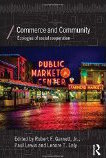Does Lowering Barriers to Goodness Promote Pathological Altruism?
In The Freeman today, Fred Foldvary asks “Do Markets Promote Immoral Behavior?”
After distinguishing markets (buying and selling operating within an ethical and legal framework) from bazaars (spaces characterized merely by buying and selling) and exploring the universal ethic operational within markets, (in Foldvary’s definition ethical action hinges upon voluntary actions and transactions that generate beneficial consequences), Foldvary goes on to discuss the ways in which markets not only inhibit immoral behavior but also promote good. He writes:
By deterring coercive acts, rehabilitating criminals, and providing restitution for victims, the free society steers human action toward those acts that are good or neutral. Adam Smith, who popularized the concept of the invisible hand of the market, also wrote in his book, The Theory of Moral Sentiments, that people have a natural fellow-feeling or sympathy for others. Social entrepreneurs can promote sympathy for communities and benevolent causes, which promotes morally good behavior.
Relative to today’s interventionist economies, the free market promotes good behavior by avoiding the imposition of costs and restrictions. In today’s world, even when good acts are not prohibited, they are impeded with costs such as taxes, licenses, and permit requirements. Even when an organization is tax exempt, it must today fill out forms and report on its activities. The free market promotes good behavior more than today’s interventionist economy by avoiding barriers that make goodness more costly.
It’s an intriguing thought that market systems can actually lower the barriers to entry for beneficent actions. But, as we are reminded by the recent publication of a new collection edited by Barbara Oakley, there ain’t no such thing as a free lunch.
Oakley has dared to delve into sticky terrain that challenges us to consider the limits of altruism and to become cognizant of when our help simply becomes unhelpful. The collection promises to be an intriguing conversation starter that may not only offer a corrective to our current philanthropic fetishes of altruism and donor intent, but also to challenge our understanding of the interplay between sociobiology and the epigenetic forces of culture and belief. How, we might ask, has nature wired us to be cooperative (altruistic) but also allowed us to develop patterns of doing good that not only cost us dearly in indulging our moral greed but can actually diminish the personal development of those we aim to help?
Under current cultural conditions, lowering the barriers to doing good may exacerbate a frightening and expansive tendency of meddlers, busy-bodies, do-gooders, and social engineers to muck about in the lives of others, nudging us here and there with “knowledge” that soon imperializes into policy mandates. This new puritanism is really for our own good, right?
Judging by the company Foldvary keeps, I believe he has a different idea in mind, one of a Tocquevillean world in which “good” is done in the context of voluntary association rather than through the institutions of the welfare state. If so, lowering barriers to doing good means lowering barriers to interpersonal association, intersubjective knowledge, and the possibility of covenantal relationships of care… all the while preserving rights of exit.
But language is a slippery slope, and it is desirable that even those of us who advocate philanthropic freedom recognize that such freedom is not good ex ante, but that philanthropy too is a realm of responsibility, consequences, and potentially coercive acts, especially when do-gooders turn to the use of welfare state powers to do good unto others. In the latter cases, we should be very wary of the operation of pathological forms of altruism, among which may be using the pretense of doing good to mask pathological self-interest.
Read more: http://www.fee.org/the_freeman/detail/how-markets-promote-moral-behavior#ixzz2WaXuwB8A




